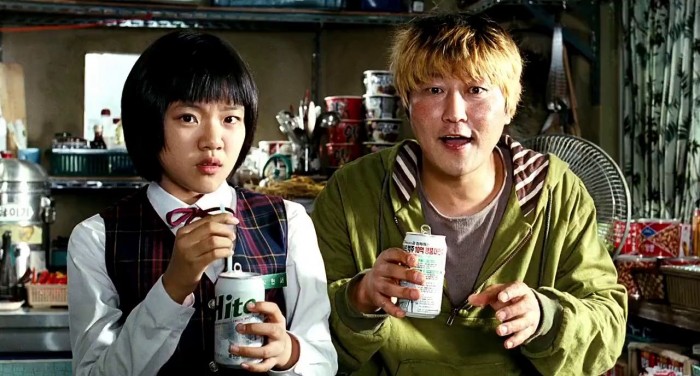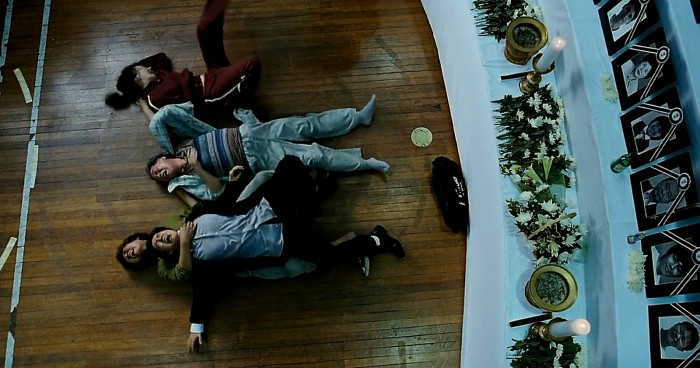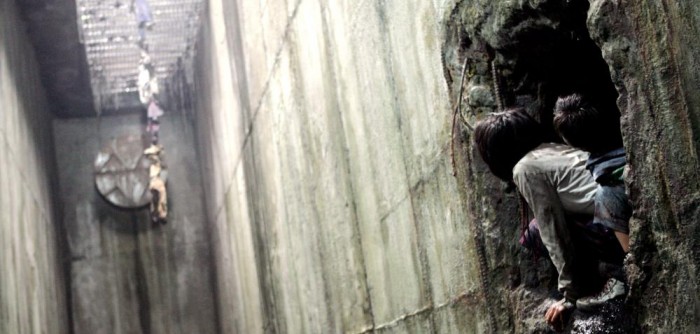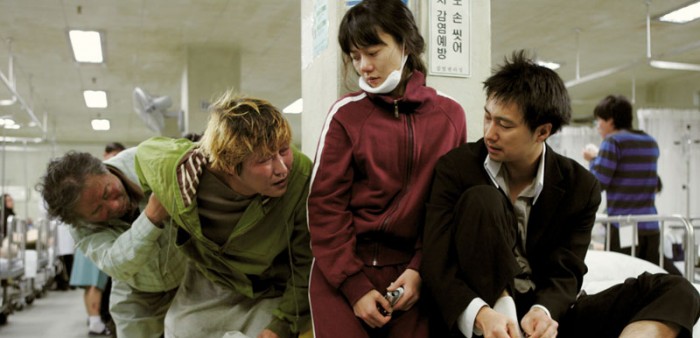10 Years Later, 'The Host' Is Still One Of The Greatest Monster Movies Ever Made
When The Host was first released, it broke box office records in South Korea, and received critical acclaim upon its festival and stateside debut. It's been a decade since then, and in the intervening years, the movie's reputation as a masterpiece has only solidified.
Directed by Bong Joon-ho (Memories of Murder, Mother, and more recently Snowpiercer), the film centers on a family thrown into chaos after a monster emerges from the Han River and kidnaps its youngest member. It's a monster movie, a family movie, a tragedy, a comedy, and a sociopolitical commentary; its elements should be at war with each other, but instead, they coalesce into a remarkable whole. A decade after release, it's better than ever.
Meeting the Monster
Bong Joon-ho seems to have an affinity for monsters, particularly when it comes to subverting the usual conventions in putting them up on screen. The biggest divergence from genre conventions occurs less than 15 minutes into the film. Instead of coming after a belabored build-up, the reveal of the monster is the first act's opener: the creature appears on the banks of the Han River in broad daylight and immediately begins eating every human in its sight. It's a horrifying sequence, from the shot of hands grappling desperately with the chained doors of a shipping crate as blood streams out onto the concrete beneath, to the way the monster labors in swallowing bodies. But the most harrowing part isn't the carnage the monster wreaks. Instead, it's the simple revelation of our hero having grabbed the wrong hand.
Family Matters
There's a lot packed into The Host. The monster, of course, dominated the marketing. Then there's the fact that the very first scene in the movie, in which an American military staffer orders his assistant to pour out 200 bottles of formaldehyde into a drain leading to the river, is based on real events (though they didn't result in a monster), and the portrayal of American diplomats as either incompetent or willfully destructive. It's a movie that could be dissected any number of ways, but there's one core to all the layers: the family.
We follow along with three generations of the Park family. There's Hee-bong (Byun Hee-bong), who runs a small snack shop by the river with his son, Gang-du (Song Kang-ho), while his daughter Nam-joo (Bae Doona) competes in archery and his other son Nam-il (Park Hae-il) tries to sort out his life after having graduated from college. All of them dote on Gang-du's daughter Hyun-seo (Go Ah-sung), who seems to be the sharpest out of all of them despite only being in middle school. Though the movie has about as many branches as its monster has tails, it still pays a remarkable attention to detail, and there's not a single end left dangling. It's this level of detail that immediately ties us to the family, which in turn makes the scene on the riverbank devastating despite how early it happens in the film.
As the monster continues to wreck the riverside park, Gang-du spots Hyun-seo and grabs her hand in order to keep her with him as they run for their lives. In the chaos, he trips. The camera follows the movement of his arm as he fumbles in the grass to take Hyun-seo's hand again. When he does, he resumes running, but slowly, the camera pans back to reveal that the hand he's holding doesn't belong to his daughter, but to another young girl. Hyun-seo's still trying to get to her feet behind him, and then, within the next second, she's gone.
Again, this works as an opening gambit, not just because we now know what the stakes are, but because we've already been made to care. We've seen Gang-du walking behind Hyun-seo and holding up her backpack even as the straps are still around her arms, just to save her from carrying the weight. There's the empty ramen bowl he's been using as a piggybank, too, as he tells her he's been saving up to buy her a new cellphone; we see him cradling it in numb silence in the immediate aftermath of the attack. This sort of detail also manifests in one of the movie's funniest — and most upsetting — scenes. As the family gathers in front of the memorial that's been set up for the victims of the monster's attack, their sheer emotions cause them to collapse, deteriorating into wailing and writhing as a pack of paparazzi close in. Even through the grief, Hee-bong can be seen trying to pull down Nam-joo's shirt in a bid to preserve some of his daughter's dignity.
The Comedic and the Tragic
One of the most remarked-upon aspects of The Host is the balancing act it pulls off between comedy and tragedy. Much like the bulk of Park Chan-wook's work, or (for my money) one of last year's best films, Na Hong-jin's The Wailing, The Host finds humor in what seem like the bleakest of situations, from the memorial scene to the fact that Gang-du is utterly out of his depth when it comes to dealing with the tragedy that's befallen them. There's something idiotic about the image of him running behind a truck as it sprays disinfectant in an attempt to keep himself free of the supposed virus that the monster is carrying, but the explanation for it makes laughter a little harder to muster up. He's trying to keep himself from infecting his daughter if/when they find her.
The film's score underlines the thin genre line that the movie treads (the truck scene is scored by music that could have come out of a Ghibli film, given how well it conveys a sense of adventure). It hits all of the usual adventure/horror movie beats, but it seems to be less about building up tension through use but making it more obvious when it drops out. The warmest and the most horrific moments are both set to silence. The Host kills off two of its principal cast (and this is a spoiler, if you haven't seen the movie yet), and both scenes use silence to drive the emotion home. The first time the family confronts the monster, Gang-du tosses his father a rifle that he says has one bullet left. Hee-bong goes down to the riverbank to finish off the creature, but as it comes charging down the path and he pulls the trigger, there's silence. Gang-du has miscounted. That silence persists as Hee-bong turns around; there's no panic in his face, just a sort of acceptance as he waves to his children to keep running. It's a sickening lack of noise, particularly as the next sound we hear is the monster mowing Hee-bong down, killing him instantly. In a wrenching parallel, the blocking and editing of the sequence is copied at the end of the film when Gang-du confronts the monster himself, just after pulling his daughter's dead body from the monster's maw.
That Hyun-seo doesn't survive is a shock, not least because the whole movie centers on her attempted rescue. It reflects Bong's refusal to take the easy way out, grounding fantastical stories through inherently human — and sometimes difficult — details. For instance, the last scene of the whole family together is a fantasy rather than a reality. They sit around a small table to eat in near-darkness, with a hole in their midst now that Hyun-seo's been taken. But as they eat in silence, she materializes between them. There are no words exchanged, no statements made — quietly, they feed her, fix her hair, treat the idea of her just as they would if she were really there. It's a last respite. There's nothing else so supernatural in the movie — even the monster is explained away — but it still fits (no pun intended) like a dream.
Other Creatures
The themes of family and monsters are common in Bong Joon-ho's work. Generally speaking, the same could probably be said for most directors, but there's no one else who can mix and subvert genres so deftly. Mother, released in 2009, is maybe the best of his other works. It tells the story of an old woman trying to prove her son's innocence after he's supposedly tricked into confessing to a murder. It's a masterpiece in bringing a small-town drama up to near-gothic heights as, again, no detail goes forgotten, with the movie tying itself into a neat circle that's just as likely to tear you apart as satisfy. How this will work out with Bong's upcoming feature, Okja, remains to be seen, but what we already know about the movie promises great things. At its core, it seems to be the story of a girl and her monster, but what we know of the forces pursuing her (corporate greed and the perpetual question of coexistence between man and nature — even the monster in The Host is just trying to survive) and the images we've seen from the set so far suggest that it may hew closer to The Host in terms of variety in scale and the themes it addresses.
A River, a Family, and a Monster
That The Host still occupies such a prominent space in the pantheon of monster movies — let alone movies in general — is an impressive feat. But it's with good reason. It's a film that reaches sublime heights with seemingly incompatible parts, skipping through different genres while keeping a single idea at its center. It's also aged well; arguably the only thing that really dates it are the cell phones. The monster is still terrifying, though it plays second fiddle to the themes of growing up, losing a parent or a child, and moving on. Much like its monster, The Host is a mutation, and while parts of it are grotesque, it's ultimately a beautiful creature.




